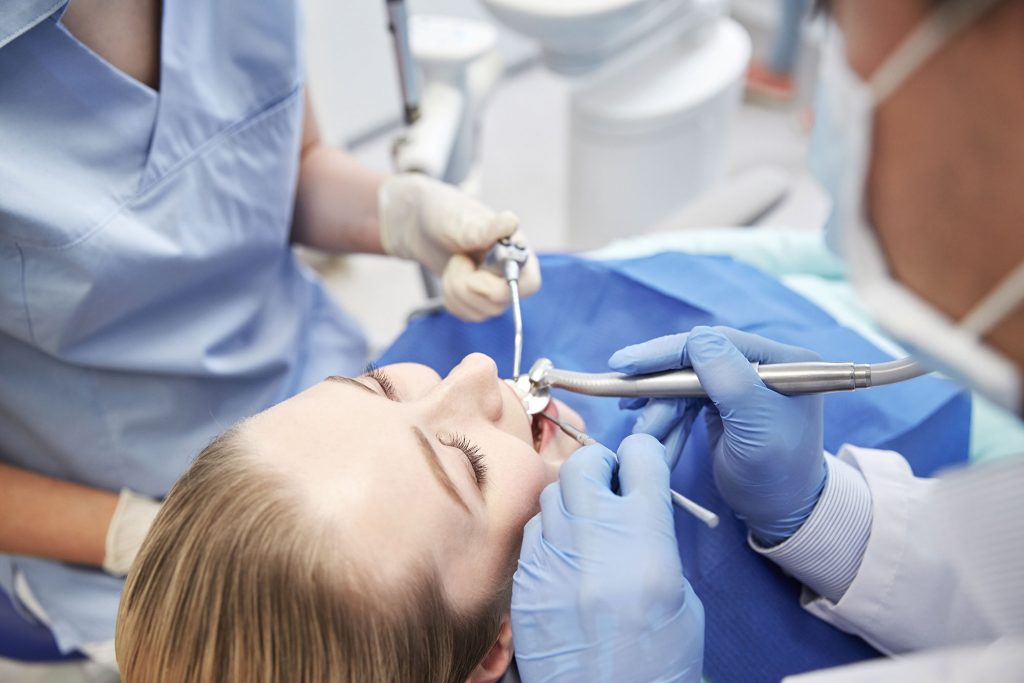There are some different types of dental specialties that you want to be aware of when you visit the dentist. It is important to know what each specialist does, so that you know you are receiving the care you need.
If you are unfamiliar with dental orthodontics or oral health in general, it can be confusing to know the differences. However, we have compiled everything you need to know into a handy guide! We hope that it will help you feel more informed about what you can expect from an orthodontic practice.
These are the five main dental specialties:
- Cosmetic Dentistry
- Geriatric Dentistry
- Implant Dentistry
- Oral Microbiology
- Reconstructive Dentistry
We have also thoroughly broken each field down for you, so let’s get started!
Cosmetic Dentistry
Cosmetic dentistry is broken down into two main groups. The first is dental and the second is skeletal. This type of dentistry also has to do with the lower portion of a person’s face, including all parts of the mouth and jaw. This type can also be referred to as aesthetic dentistry.
This dentistry is classified in the dental category when alterations are made to the patient’s teeth. This could be moving the teeth, taking parts of them out, or adding to them. A dentist will add to your tooth by using bonding (a type of plastic) or porcelain. They can also reshape your teeth with drills and other specialized tools.
When cosmetic dentistry is skeletal, it likely means that your jawbones are being adjusted. This can be done through surgery or other orthodontic treatments.
In orthodontic care, you can expect to see braces or aligners as part of this type of treatment. If you have questions about braces, we have explained their process briefly below.
How Braces Work
Braces work by slowly straightening out your teeth. This can be done by separating crowded teeth, turning teeth back to the correct angles, or pulling teeth closer together- whatever type of misalignment issues you have, braces are sure to correct them.
Braces work very slowly by keeping constant pressure on your teeth. Aligners, such as Invisalign clear braces, work in much the same way. By moving slowly, you feel less pain and the results can become more permanent.
Braces can also improve your bite and jaw alignment- both of which are necessary for eating without any problems. This also can make speaking easier in some people.
Geriatric Dentistry
This type of dental specialty is designed to help the oral of the elderly. They are more likely to have worse medical issues and take more medicines- meaning that they need more care when it comes to dental health. Certain medicines should not interact with others, so a dental orthodontic practice will be educated on what they can do.
Geriatric dentistry is based on the idea that elders experience different forms of tooth and gum decay than their younger peers. The treatments are more specified to them and tailored to their needs.
While many elderly people do keep most of their adult teeth, many suffer from tooth loss and dental decay. This can lead to them having problems chewing and eating less, which then leads to malnutrition and other problems.
Specialists in this field are also trained in working with patients that are suffering from Alzheimer’s, or other mental disorders. These patients can become frightened during a procedure, so geriatric dentists are often kind people who can soothe them and make their patients feel comfortable.
Gum disease is a form of infection that is more common in the elderly than in other age groups. It has also been linked to heart diseases and stroke, plus diabetes. Geriatric dentistry specialists work hard to provide oral care to people so that they can protect their health during retirement stages of life.
Implant Dentistry
In dental orthodontics, a dental implant is a manmade tooth root. It connects any false teeth to the jawbones underneath the gums. In other words, dental implants are inside the gum and give the artificial tooth a place to attach.
A single implant creates a space for one tooth and up to eight implants can be put in one jaw- this is only done if the patient has lost all of their teeth.
Because the implant is connected to the bone, it can take a long time to heal. This makes them take up to 6 to 12 months to be finished. Healing is important so that there is no risk of infections, so for every artificial tooth that needs to be added, you can expect to wait a good while.
Your need implant also needs to be watched carefully to ensure that it is reacting well to the bone and skin in your mouth. This is because there is a chance that your body rejects the dental implant and refuses to give it the space to heal to your jawbone.
You can help your body accept the implant by taking good care of it after surgery- this means cleaning it, the gum around it, and following all of your orthodontist’s instructions. That way, it will heal properly.
The research behind this is comparable to what you might see in orthopedics. When fixing a bone, screws or rods are often used to keep everything in place. The body will rarely reject these materials, since there has been so much research and studies done behind it.
Oral Microbiology
Many people hate to think about it, but there several hundred species of oral bacteria living in your mouth right now. This is the dental specialty that studies the mouth, digestive systems, and other areas that connect to the mouth. It is focused on the microbiology found there.
Gum disease and tooth decay can be caused by bacteria and affect other aspects of your health, such as your heart. This field is responsible for the oral vaccines and antibiotics that react to specific damaging bacteria.
Scientists that specialize in oral microbiology are currently searching for ways to prevent cavities with a vaccine. If they are successful, you might never have to worry about getting another cavity again! They also are the ones you can thank for any dental antibiotics you have had to take.
The bacteria in your mouth can react to sugar and when they do, it creates an acid that erodes your enamel over time. This is why many dentists say to avoid sugary drinks or soda and suggest that you rinse your mouth out after drinking them. Doing this stops the bacteria’s reaction early and can prevent damages to your teeth.
Reconstructive Dentistry
This type of dental specialty revolves around rebuilding the parts of the mouth. Normally, a professional will have metals and porcelain at their disposal for building teeth and jawbone.
You will need these types of treatments if you have had severe oral problems in the past. This could be from many awful cavities, gum diseases, or your teeth and bone being damaged in a severe accident.
This type of dental specialty is also known to combine aspects from the other ones. For example, you might need oral surgery, dental implants, crowns, and braces after an accident. These complicated reconstructions will be to stop any infections or diseases before they go on to repair the damages. This is because you want to stop the issues before you try to fix them- otherwise more problems can arise in your mouth.
Once you have gone through reconstructive dental treatment, you will need to be sure that you are cleaning your teeth more often than before, as you are at a higher risk of infection. You will also want to listen closely to your orthodontist and be sure to follow their advice.
They will also often ask you to come in for checkups. This is to ensure that the reconstruction went smoothly, your body is not rejecting it, and that your mouth is healing up properly.
Other Specialties- Forensics and Oral Medicine
While those were the main dental specialties that you will run into at an orthodontic practice, there are other fields that dental orthodontics covers. They are not considered to be specialties, but they are still important for professionals to know thoroughly.
Of these other specialties, forensics and oral medicine are more common.
Forensic Dentistry
Forensic dentistry has to do with any legal problems in the orthodontic world. It is not practiced by many and normally overlooked in a dental education program. Although, it is extremely important in our world today.
This is because our teeth are more resistant to destruction- it is even easier to destroy bones than it is a single tooth! The way our teeth sit in our mouths is unique to every person as well, making them as useful as fingerprints in the legal setting. Dental records can also lead to finding someone based on the bite marks they left behind on a piece of food.
It is also amazingly accurate. The tiniest of irregularities in our mouths are each unique to us- meaning that bite marks are crucial to identify if someone was present at a crime scene. Plus, you can not fake someone else’s bite pattern that is left behind on food.
Forensic dentistry can also be used to determine the age of a person, if they were abused, and determine who caused a bite mark injury. In short, this field is amazing at solving crimes, finding missing people, and accurately determining other legal factors.
Oral Medicine
Oral medicine, also called stomatology, is there to treat oral diseases. These diseases could be affecting your mouth, but also the mucous membranes inside of it. The mucous membrane is a lining that acts as a barrier between your body and the outside world, without it, we would be constantly suffering from infections and tons of other problems.
Those specializing in oral medicine also work with searching for treatments to oral cancer- which is dangerous due to its closeness to many vital body parts. Often, oral cancer patients will need to undergo a thorough examination where the oral pathologist studies removed portions of their mouths or teeth.
Additional Fields
These types of dental fields are not considered specialist areas, but they are still necessary for a beginner to know.
Dental Hygienist
A person in this field will improve your health by cleaning and taking care of your mouth. They understand that prevention is the best way to treat an oral disease and often educate others on the best ways to clean their teeth.
A hygienist will usually work under a dentist in their office and remove stains on the patient’s teeth and record information for the dentist.
Dental Assistant
Dental assistants can be found at the practice, where they work to aid the dentists and orthodontists. They will clean equipment, greet and check-in patients, and help keep an accurate record of their visit.
Dental Auxiliaries
Dental nurses and auxiliaries can provide dental care to children. Someone specializing in this area is also often required to obtain a degree in various aspects of oral health- this could be dental hygiene, dental therapy, and other oral health-related fields.
Conclusion
There are many different dental specialties out there. As a beginner looking for dental orthodontic treatment, you want to be sure that you are informed as you go through the process. Oral health is interesting and you will probably enjoy learning about it!
We hope that this guide was able to shed some light on all the different aspects of oral health care to you. If you feel more confident in your knowledge you are more likely to seek treatment if you feel that something has gone awry in your mouth. In short, if you think that you are going to need a specialist in orthodontic care, we want to help you. We hope that by answering any questions that you have about how braces work and keeping you informed during the treatment that you feel comfortable and welcome at our office.



